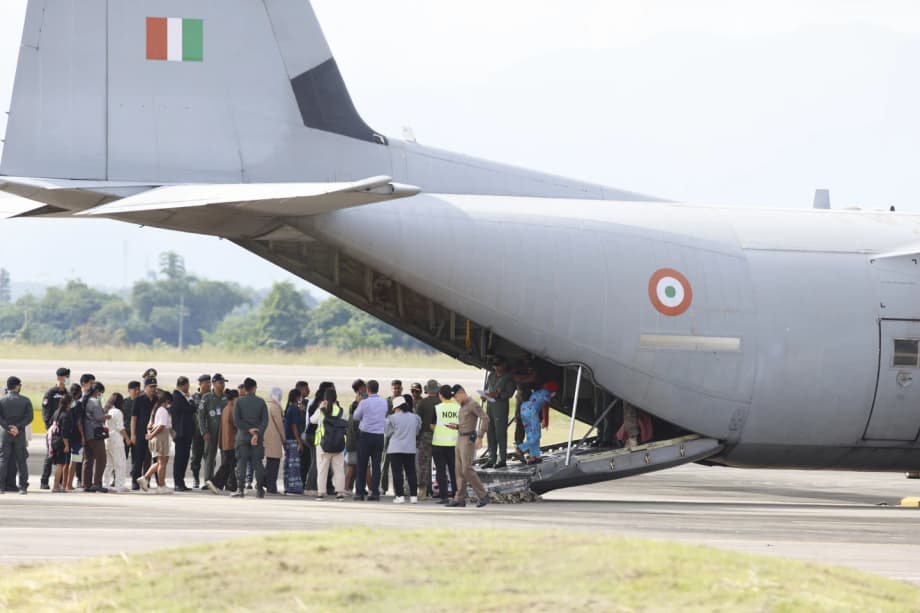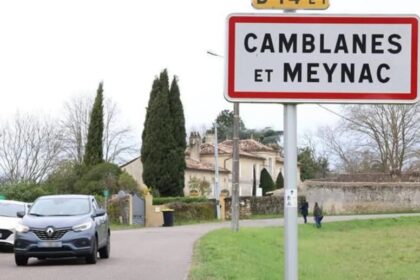Cross border rescue after a raid in Myanmar
India has begun flying home the first group of hundreds of its citizens who fled to Thailand from a massive cyber scam complex in Myanmar. The compound, known as KK Park on the outskirts of Myawaddy, was raided by the Myanmar army in mid October. In the days after the operation, thousands ran for the border. Among them were 465 Indian passport holders. On Thursday, an Indian Air Force transport aircraft carried 270 men and women from the Thai border town of Mae Sot to India, with a second flight scheduled later in the day. Thai officials said the remaining Indians are slated to depart next Monday after identity checks and legal clearances.
Those returning are part of a much larger exodus. Thai authorities say more than 1,500 people from 28 countries crossed into Mae Sot after the raid, including nationals of China, Vietnam, the Philippines, Ethiopia, Kenya, and India. Many of them told officials they had been trapped in scam compounds that forced them to run online swindles under threats of violence. Thailand set up temporary holding facilities for screening and basic care. Because most entered Thailand without valid visas, they were processed for immigration violations while their embassies arranged travel documents and flights.
The scale speaks to a regional industry of fraudulent call centers and online con games that has exploded across parts of Southeast Asia. The UN Office on Drugs and Crime estimates that hundreds of industrial scale scam sites in the region generate just under 40 billion dollars a year in profits. Human rights officials say hundreds of thousands of people have been trafficked to work in these compounds, with many lured by false job offers and then subjected to abuse when they refuse to take part in fraud.
Who the returnees are and how they got trapped
Interviews with victims and ongoing criminal investigations point to a common script. Recruiters based in India and abroad advertise lucrative openings in information technology, customer support, and digital marketing. The jobs appear to be in Bangkok or Kuala Lumpur. Applicants complete online tests, receive contracts, and are told that the employer will handle travel and housing. Once they land in Thailand, handlers move them toward Myanmar’s border, often at night. Phones and passports are taken away. When new arrivals object, the response is threats, confinement, or the claim that they must buy their freedom.
Promises of IT jobs turned into captivity
Scam recruiters approach targets on social media and messaging apps with tailored offers. They speak in local languages, share company logos, and sometimes use forged appointment letters. Many charge a placement fee that leaves recruits indebted from day one. The route often passes through Mae Sot, the busy Thai town opposite Myawaddy, where private vehicles or vans ferry groups to the river crossing. Victims say they were told this was a temporary transfer to a special economic zone and that official clearance would follow.
Reality inside Myanmar’s scam enclaves is very different. Newcomers are told to create fake personas, open dozens of chat accounts, and begin contacting targets on dating apps, investment forums, and social media. Managers set daily and monthly cash targets. Failure brings fines, beatings, or resale to another compound for a higher price. Families back home receive calls demanding ransom payments. Some managed to alert embassies, but many remained unreachable for months.
Life inside KK Park
Workers describe long shifts, crowded dormitories, and constant surveillance. The scams range from romance plays known as pig butchering to fraudulent crypto investments and sports betting sites. Teams include English speakers for Western victims and Mandarin speakers for Chinese targets. Scripts direct every step of the approach, and supervisors monitor chats in real time. People who resist or underperform have reported physical abuse, electric shocks, and periods of isolation. Others were told to purchase their way out, sums that families could not afford.
KK Park sits near the frontier, which makes escape possible but risky. During the October crackdown, some recruits slipped away and reached the Moei River that separates Myanmar and Thailand. Thai soldiers and volunteers helped bring many ashore. Officials then began the careful work of identifying nationalities, arranging shelter, and coordinating with embassies to send people home. That is how the current Indian airlift began, with dozens more flights expected to follow as paperwork is finalized.
KK Park and the Myawaddy border economy
KK Park has been one of the largest scam hubs in Myanmar’s Karen State. The site is widely reported to be linked to transnational criminal syndicates, many with roots in Chinese organized crime, and guarded by local militias that have long operated in the border economy. After the army raid in mid October, witnesses and the Thai military reported a series of explosions that appeared to demolish parts of the complex. Independent outlets in Myanmar say scam operations continue in the wider Myawaddy area, which shows how entrenched the networks have become.
Myawaddy has grown into a key staging ground for illicit industries over the past decade. The central government’s reach is limited in this region, and local armed groups exert control over territory and trade routes. The proximity to Thailand, a country with stable power, fast internet, and busy commercial crossings, allows scam networks to exploit cross border infrastructure while shielding their operations across the river.
The international crackdown and regional stakes
Recent months have brought stronger action from several governments. China pressed hard on militia controlled enclaves near its frontier and has overseen high profile arrests and repatriations of its citizens from Myanmar. Officials in Beijing say they are targeting the organizers behind the scam factories as well as those participating in telecom fraud. Thailand has increased raids in Mae Sot, arrested suspected facilitators, and in some areas has restricted power and connectivity that feed criminal compounds across the river. Joint operations with Myanmar’s security forces and local militias have freed thousands of foreign nationals, although the pace of repatriation remains slow.
Western governments are also tightening pressure. The United States and the United Kingdom recently sanctioned organizers connected to a major Cambodian scam syndicate. Prosecutors in New York unsealed an indictment against an alleged ringleader tied to romance and crypto swindles that bilked victims across continents. Enforcement actions have seized digital assets, disrupted payment channels, and pressured service providers used by scammers to communicate and launder proceeds.
Even with these moves, criminals adapt. Some groups are relocating to other parts of Myanmar or to neighboring countries such as Cambodia and Laos. Others are experimenting with new offshore payment routes and more sophisticated scripts. Law enforcement agencies say sustained cooperation, faster information sharing, and safe corridors for victims are the only way to shrink the market for forced labor and cross border fraud.
India’s response and next steps
The current airlift fits a pattern of sustained action by New Delhi. In March, India repatriated 549 nationals after earlier crackdowns shattered scam compounds along the Thai Myanmar frontier. This week’s flights from Mae Sot brought home 270 people, including women who were among the most vulnerable. Indian officials in Bangkok and Chiang Mai have coordinated closely with Thai authorities to verify identities, issue emergency travel documents, and move people to flights.
On arrival in India, returnees are questioned by investigative agencies to understand how recruiting networks operate, where the money flows, and who among the returnees may have acted under coercion or knowingly joined criminal work. Authorities have also renewed warnings to citizens about offers that promise quick wealth from overseas tech jobs. Applicants are urged to verify employers, check recruiting agents, and avoid traveling to border areas for employment without proper visas. Consular teams continue to work on the cases of Indians still believed to be inside Myanmar scam zones.
How the scam playbook works
Scam compounds specialize in social engineering, the art of deceiving targets into moving money. One popular approach is pig butchering, a long game in which a scammer builds a fake relationship over weeks or months before pushing the victim to put savings into a phony investment platform. Other teams run high pressure trading rooms that promote new coins, crypto arbitrage, or fake commodity trades. The sites look professional, but they only show fictional gains until the victim tries to withdraw funds.
Behind the scenes, the proceeds move through a chain of payment processors and crypto wallets to make recovery difficult. Some rings use money mules and shell companies to open bank accounts. Others prefer cryptocurrency and over the counter brokers who convert digital assets to cash. Recruits trapped inside the compounds are ordered to maintain dozens of online personas at once, shift time zones to match target markets, and follow scripts that have been refined after thousands of attempts. The long hours and constant surveillance keep both the workers and their victims under pressure.
Why Southeast Asia became a hub
Criminal networks took root in Myanmar, Cambodia, and Laos during a period of political instability and weak law enforcement. After a military coup in Myanmar in 2021, fighting between the junta and ethnic armed groups fragmented authority along the borders with China and Thailand. In these gray zones, militias, businessmen, and officials found profit in informal taxes and fees on illicit industries, including scam compounds. Syndicates with experience in Macau gambling migrated their skills to fraud factories, using the same infrastructure of fixers, accountants, and enforcers.
Border towns like Myawaddy offered a strategic mix: access to Thai internet and electricity, a stream of job seekers from across Asia and Africa, and the cover of private special zones that promised light regulation. When one hub comes under pressure, operators move equipment and staff to another site. That mobility makes permanent shutdown difficult. It also explains why international cooperation and victim centered repatriation have become central to any lasting reduction in cross border fraud.
Key Points
- India began repatriating 270 of 465 citizens who fled Myanmar’s KK Park cyber scam complex to Thailand after an army raid in mid October.
- Thai authorities say more than 1,500 people from 28 countries escaped to Mae Sot, where they are being processed and housed before flights home.
- UN officials estimate industrial scale scam sites across Southeast Asia generate just under 40 billion dollars in profits each year.
- Victims, including many Indians, were lured by fake tech jobs, then forced to run online frauds under threats of violence and debt bondage.
- KK Park has been partly damaged since the raid, but reports indicate scam operations persist in the wider Myawaddy area.
- China, Thailand, and Myanmar have stepped up crackdowns, while the United States and the United Kingdom have sanctioned organizers tied to cross border fraud.
- India repatriated 549 nationals earlier this year and warns citizens to verify employers and avoid traveling for work on tourist visas.
- Scam compounds use romance and investment plays, often called pig butchering, and move funds through complex banking and crypto channels.
- Conflict and weak governance in parts of Myanmar, Cambodia, and Laos allowed syndicates to build fraud hubs that can relocate quickly when pressured.
- Further Indian repatriation flights are expected, with screening of returnees to trace recruiters and provide support to trafficking victims.












